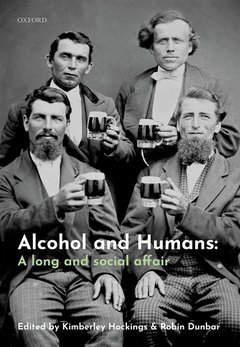Alcohol and Humans A Long and Social Affair
Langue : Anglais
Coordonnateurs : Hockings Kimberley, Dunbar Robin

Alcohol use has a long and ubiquitous history. The prevailing tendency to view alcohol merely as a 'social problem' or the popular notion that alcohol only serves to provide us with a 'hedonic' high, masks its importance in the social fabric of many human societies both past and present. To understand alcohol use, as a complex social practice that has been exploited by humans for thousands of years, requires cross-disciplinary insight from social/cultural anthropologists, archaeologists, historians, psychologists, primatologists, and biologists. This multi-disciplinary volume examines the broad use of alcohol in the human lineage and its wider relationship to social contexts such as feasting, sacred rituals, and social bonding. Alcohol abuse is a small part of a much more complex and social pattern of widespread alcohol use by humans. This alone should prompt us to explore the evolutionary origins of this ancient practice and the socially functional reasons for its continued popularity. The objectives of this volume are: (1) to understand how and why nonhuman primates and other animals use alcohol in the wild, and its relevance to understanding the social consumption of alcohol in humans; (2) to understand the social function of alcohol in human prehistory; (3) to understand the sociocultural significance of alcohol across human societies; and (4) to explore the social functions of alcohol consumption in contemporary society. 'Alcohol in Humans' will be fascinating reading for those in the fields of biology, psychology, anthropology, archaeology, as well as those with a broader interest in addiction.
Kimberley Hockings is a lecturer in Conservation Science at the Centre of Ecology and Conservation at the University of Exeter. Her research examines the ways in which human and nonhuman great apes coexist in shared landscapes, including in their overlapping use of resources such as fermented beverages. From this she has developed an interest in the evolutionary origins of ethanol consumption in humans. To effectively understand human and wildlife components of interactions her research increasingly combines biological, ecological, and social science approaches. She conducts fieldwork in Guinea and Guinea-Bissau, west Africa, and is a member of the Great Ape Section of the IUCN/SSC Primate Specialist Group. Robin Dunbar is Professor of Evolutionary Psychology at the University of Oxford, and Emeritus Fellow of Magdalen College. He was elected a Fellow of the British Academy in 1998. His principal research interests focus on the evolution of sociality (with particular reference to primates and humans). He is best known for the social brain hypothesis, the gossip theory of language evolution and Dunbar's Number (the limit on the number of relationships that we can manage). He has published 30 books and edited volumes and over 300 journal articles.
Date de parution : 12-2019
Ouvrage de 226 p.
17.7x24.8 cm
Disponible chez l'éditeur (délai d'approvisionnement : 21 jours).
Prix indicatif 61,80 €
Ajouter au panierThèmes d’Alcohol and Humans :
© 2024 LAVOISIER S.A.S.



